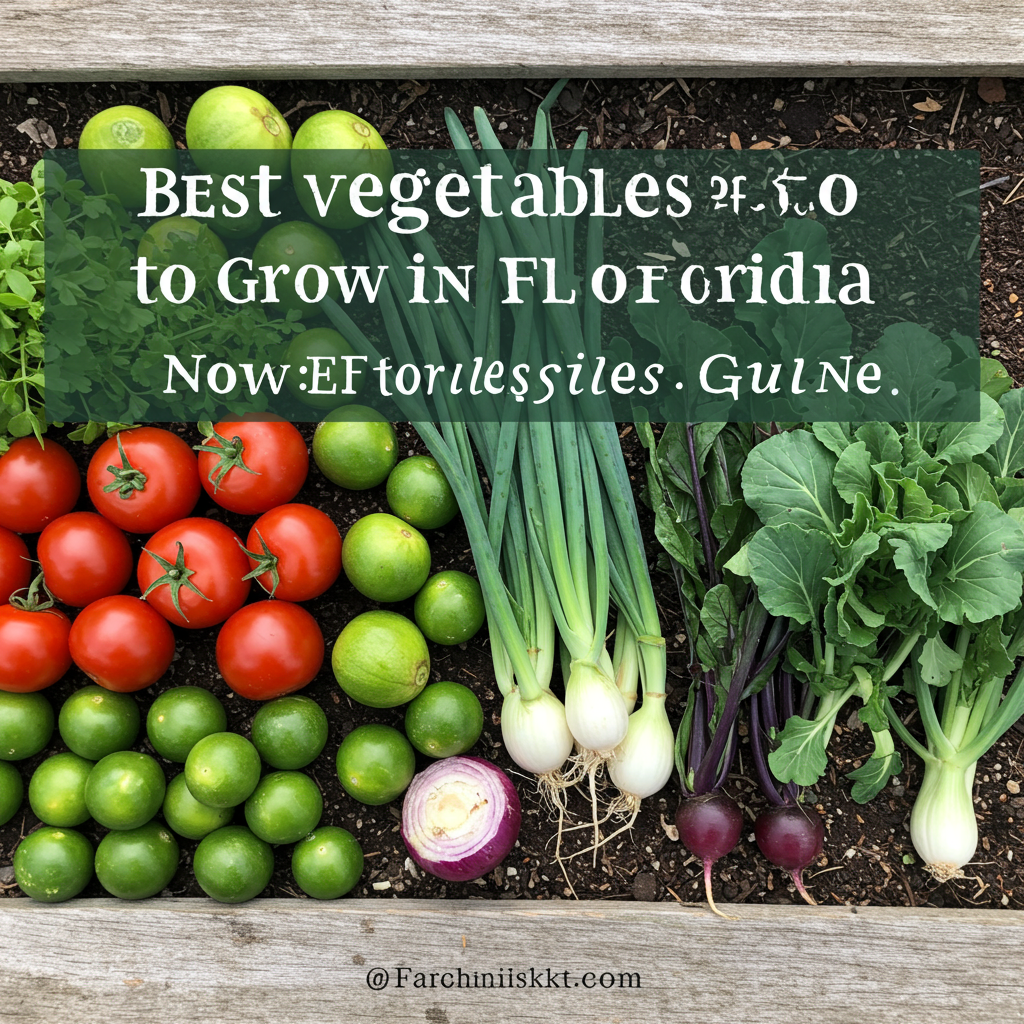Discover the best vegetables to grow in Florida right now, taking advantage of the state’s unique subtropical climate. This comprehensive guide covers everything from choosing the right crops to essential gardening tips for Florida gardeners.
Florida’s warm climate allows for year-round gardening, but choosing the right vegetables for the current season is crucial for a successful harvest. This guide helps you select the best vegetables to plant now, whether it’s the peak of summer or the mild Florida winter.

Choosing the Right Vegetables for Florida’s Current Season
Florida’s subtropical climate presents unique opportunities for gardening. While some states are limited by frost and cold weather, Florida gardeners can enjoy fresh produce almost year-round. Understanding which vegetables thrive in the current season is the key to a bountiful garden.
Summer Vegetables (June-September):
Florida summers are known for their heat and humidity. These vegetables thrive in these conditions:
- Okra: This heat-loving vegetable produces abundantly in hot, humid weather.
- Southern Peas: Black-eyed peas, crowder peas, and other southern pea varieties are well-suited for Florida summers.
- Sweet Potatoes: These root vegetables love the long, warm growing season.
- Watermelon: A quintessential summer treat, watermelon thrives in the Florida heat.
- Eggplant: Choose heat-tolerant varieties for optimal growth.
Fall Vegetables (September-November):
As the temperatures cool slightly, fall offers a different range of planting options.
- Broccoli: Fall offers the ideal temperatures for growing broccoli.
- Cabbage: Plant cabbage in early fall for a winter harvest.
- Carrots: The cooler soil temperatures of fall are perfect for carrot development.
- Lettuce: Many lettuce varieties flourish in the milder fall weather.
- Spinach: Similar to lettuce, spinach enjoys cooler temperatures.
Winter Vegetables (December-February):
Even in Florida’s mild winters, some vegetables thrive.
- Beets: Beets prefer cooler temperatures and do well in the Florida winter.
- Kale: This hardy green is a great addition to winter gardens.
- Peas: English peas and snow peas are perfect for winter planting.
- Radishes: These quick-growing vegetables are ideal for winter gardens.
- Turnips: Another cool-season crop that performs well in Florida winters.
Spring Vegetables (March-May):
Spring brings warmer temperatures and the opportunity to plant warm-season crops.
- Beans: Bush beans, pole beans, and lima beans are all good choices for spring planting.
- Corn: Sweet corn thrives in the warming spring weather.
- Cucumbers: Cucumbers love the warm, sunny days of spring.
- Peppers: Bell peppers, hot peppers, and other pepper varieties do well in spring.
- Tomatoes: A garden staple, tomatoes are a must-have for spring planting.
Essential Gardening Tips for Florida
Florida’s unique environment requires specific gardening practices.
Dealing with Heat and Humidity:
- Watering: Water deeply and less frequently to encourage deep root growth.
- Mulching: Use mulch to retain moisture and suppress weeds.
- Shade Cloth: Provide shade for sensitive plants during the hottest parts of the day.
Pest and Disease Control:
- Integrated Pest Management: Use natural methods to control pests and diseases.
- Crop Rotation: Rotate crops to prevent the buildup of pests and diseases.
- Beneficial Insects: Attract beneficial insects like ladybugs and lacewings to control harmful pests.
Soil Preparation:
- Soil Testing: Test your soil to understand its pH and nutrient levels.
- Amendments: Add compost or other organic matter to improve soil structure and fertility.
- Raised Beds: Consider raised beds for better drainage and easier gardening.
FAQs
- What vegetables can I plant in Florida year-round? Leafy greens like lettuce, spinach, and kale often do well year-round with proper care and variety selection.
- When is the best time to plant tomatoes in Florida? Spring is generally the best time to plant tomatoes in Florida.
- How do I protect my plants from the Florida heat? Use mulch, water deeply, and consider using shade cloth during the hottest parts of the day.
- What are some common garden pests in Florida? Common pests include aphids, whiteflies, and nematodes.
- How can I improve my Florida garden soil? Add compost, manure, or other organic matter to improve drainage, water retention, and nutrient levels.
Conclusion
Growing vegetables in Florida can be a rewarding experience. By selecting the right crops for the current season and implementing these essential gardening tips, you can enjoy a thriving garden and fresh, homegrown produce throughout the year. Remember to consider your local microclimate and specific conditions for the best results. Happy gardening!

